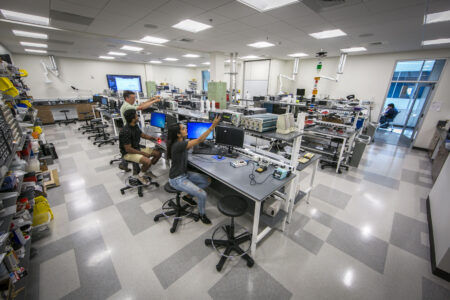The US Bureau of Labour Statistics predicts there will be nearly 140,000 new jobs expected for engineers over the 2016–26 decade. That demonstrates the huge demand for engineers across many sectors, but with the dizzying pace of technology advances and the evolving needs of employers, the only ones set to stay competitive are those with a strong, diverse set of skills.
The engineers with enduring careers are those who can tackle the world’s toughest problems through collaboration and teamwork, making a positive impact on those around them. And the best engineering leaders do this on a bigger scale, thanks to their added ability to see the big picture as they manage teams, projects, and budgets.
“Understanding how business works prepares you to not just enter the workforce but really grow your career,” says Sean McIlvane, an R&D software engineer who has Duke University to thank for his role at S&P 500 technology company Keysight Technologies.
Ranked sixth best in the US, Duke University is where the world’s brightest minds train engineers to push the envelope and boldly deploy revolutionary solutions that better the human condition. This is especially true at Duke’s Pratt School of Engineering, where programmes provide training and networking beyond the usual opportunities to learn specialised, in-demand skills. “In high-tech or STEM fields, there’s a technical skill threshold, and once you pass that, what really determines your success is the soft skills,” McIlvane says.
Soft skills, the abilities to communicate with each other and work well together, are crucial to engineers. Research found that communication skills appear in 34%, and management expertise in 24% of job postings for engineers. In a LinkedIn report, the three soft skills in highest demand among job postings for engineers were communication, leadership and analytical abilities.
What this data shows is that business skills are a non-negotiable must-have for engineers to execute daily responsibilities – that requirement is greater still for senior engineers, product managers, and engineering team leaders.
The Pratt School knows this well. As the school ranked #23 in the US, engineering master’s degrees break from what’s traditionally offered by other schools. Instead of degrees that culminate in a thesis, these programmes were designed specifically for those who want to transition directly into industry or entrepreneurship. Take the Master of Engineering (MEng) programmes, for example.
With 16 engineering specialisations to choose from, these programmes incorporate business courses, in addition to your core subjects, such as Business Fundamentals for Engineers and Management in High-Tech Industries. These provide you with soft skills like leadership and communication, which are essential to succeeding in the industry.

The school’s MEng offers 16 engineering specialisations, all incorporating business courses. Source: Duke University
The other is the Master of Engineering Management (MEM), which is available on campus or online – the latter is ranked third Best Online Engineering Management Master’s Programmes by US News & World Report. This tech-savvy alternative to a Master of Business Administration (MBA) has four core courses revolving around marketing, finances, management, and the legal aspects of engineering. These courses are developed in partnership with Duke’s top-ranked Law School and Fuqua School of Business, thus expanding your skillset and strengthening your chances of standing out to potential employers.
“In one of our core courses, Management of High-Tech Industries, we learned the nuances of working with people, managing relationships, and leading teams,” says alumnus Adityanath Mittal. “We actually practise having difficult workplace conversations, analysing them, and learning techniques for building trust and collaboration in teams. Today, I feel comfortable talking to anyone in the company, even a CEO.”
In addition to your degree, you can enhance your skills with graduate certificate programmes. Mittal, who had his own venture prior to joining Duke University, took the Innovation & Entrepreneurship certificate programme. As a result, he now knows how to work for strategically.
“While earning my Master of Engineering Management degree, I also got a certificate in Innovation & Entrepreneurship, which allowed me to take on real-world implementation of the skills I learned through my programme,” he says. “This taught me how to structure the whole process and deliver a tangible result.”

The Master of Engineering Management courses exposes students to marketing, finance, product and programme management. Source: Duke University
A faculty of industry experts
The school’s faculty are made up of world-class industry practitioners, each with their own expertise. They provide insights into the latest industry trends, fusing examples and case studies from their own cutting-edge work into their classes. For example, Brinnae Bent, an artificial intelligence (AI) and machine learning research scientist in healthcare, is now teaching the newly launched online Coursera specialisation, Explainable Artificial Intelligence (XAI) and its MEng in Artificial Intelligence.
The Duke alumnus’s work and interests revolve around the creation of ethical AI and its importance – both of which would not have been possible without her MEng’s emphasis on soft skills.“If engineers don’t know how to robustly evaluate a machine learning model, they may ship it to production and cause problems for real people,” she says. “If they don’t think about the ethical consequences of their algorithm development while in the classroom, they won’t when they are out building ChatGPT 2.0, either.”
More recent graduates like Grant Eberle similarly credit their well-rounded MEng for making them outstanding graduates. “The most important way that Duke prepared me for my engineering career was the integration of business coursework with heavy science coursework,” alumnus Grant Eberle says. “Now I’m not only able to contribute technically, but also in terms of communication skills, soft skills, and understanding of project management. That’s been super helpful and one of the most valuable things I’ve brought to the workforce so far. You don’t get that from programmes that are solely focused on writing a thesis.”
Follow the Pratt School of Engineering at Duke University on Facebook, Instagram, LinkedIn, and YouTube.












